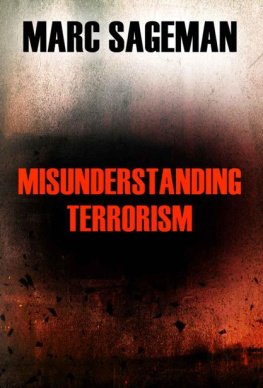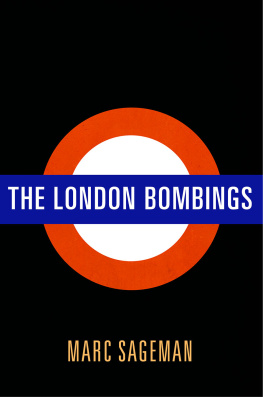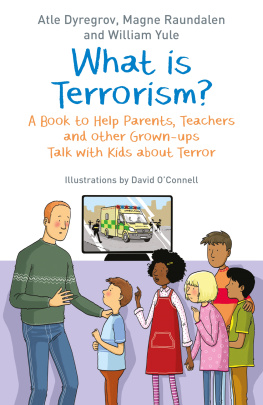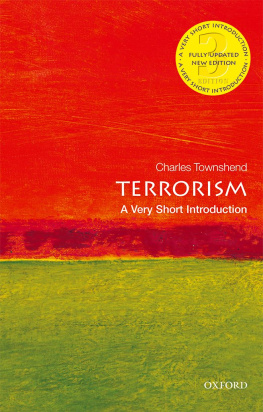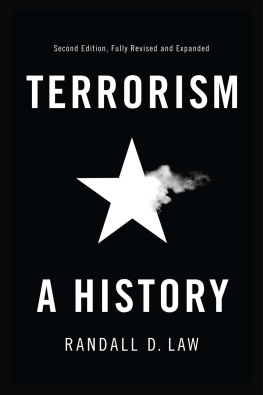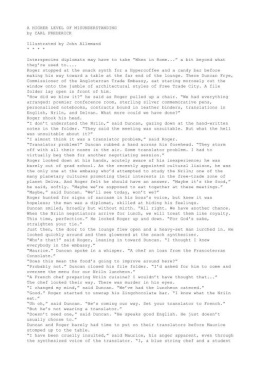Marc Sageman - Misunderstanding Terrorism
Here you can read online Marc Sageman - Misunderstanding Terrorism full text of the book (entire story) in english for free. Download pdf and epub, get meaning, cover and reviews about this ebook. year: 2016, publisher: University of Pennsylvania Press, Inc., genre: Politics. Description of the work, (preface) as well as reviews are available. Best literature library LitArk.com created for fans of good reading and offers a wide selection of genres:
Romance novel
Science fiction
Adventure
Detective
Science
History
Home and family
Prose
Art
Politics
Computer
Non-fiction
Religion
Business
Children
Humor
Choose a favorite category and find really read worthwhile books. Enjoy immersion in the world of imagination, feel the emotions of the characters or learn something new for yourself, make an fascinating discovery.
- Book:Misunderstanding Terrorism
- Author:
- Publisher:University of Pennsylvania Press, Inc.
- Genre:
- Year:2016
- Rating:3 / 5
- Favourites:Add to favourites
- Your mark:
- 60
- 1
- 2
- 3
- 4
- 5
Misunderstanding Terrorism: summary, description and annotation
We offer to read an annotation, description, summary or preface (depends on what the author of the book "Misunderstanding Terrorism" wrote himself). If you haven't found the necessary information about the book — write in the comments, we will try to find it.
Misunderstanding Terrorism — read online for free the complete book (whole text) full work
Below is the text of the book, divided by pages. System saving the place of the last page read, allows you to conveniently read the book "Misunderstanding Terrorism" online for free, without having to search again every time where you left off. Put a bookmark, and you can go to the page where you finished reading at any time.
Font size:
Interval:
Bookmark:
Marc Sageman

UNIVERSITY OF PENNSYLVANIA PRESS
PHILADELPHIA
For my parents, who survived the worst political violence in history
Copyright 2017 Marc Sageman
All rights reserved. Except for brief quotations used for purposes of review or scholarly citation, none of this book may be reproduced in any form by any means without written permission from the publisher.
Published by
University of Pennsylvania Press
Philadelphia, Pennsylvania 19104-4112
www.upenn.edu/pennpress
Cataloging-in-Publication Data is available from the Library of Congress.
ISBN 978-0-8122-4889-0 hardcover
ISBN 978-0-8122-9371-5 ebook
Since childhood, Ive been haunted by the issue of political violence. For me, new political massacres have always raised the question, How is this possible? For the past 45 years, Ive studied this issue, first from the perspective of the victims and then from that of the perpetrators. In the past decade, I had access to inside information about these perpetrators and was able to interview a few dozen of them. As my understanding grew, I perceived a huge gap between that understanding and the portrayals of terrorism in the media, Internet, and official government statements, which create the conventional wisdom on the subject. Our understanding of terrorism has very important implications for the development of policies to deal with it. Is the threat to our security so great that we should give up some of our fundamental rights such as liberty, free speech, and privacy? Should the state preventively detain, or even kill, a person suspected of being a terrorist? Because of the gravity of these questions, in this book I address what I see as a general misunderstanding of terrorism.
My obsession with political violence comes from the fact that my parents are Holocaust survivors. Like most survivors, they never talked about the war, including the details of their own suffering, least of all with their children, whom they tried to protect at all costs. And like many children of survivors, I never asked them about their experience, to spare them the pain of revisiting their trauma. This tacit conspiracy of silence lasted until I left home for college, where I became obsessed with accounts of other survivors. After spending two years devouring the wealth of information on the Holocaust at Widener Library at Harvard, I did not want that time to have been wasted and wrote my undergraduate thesis on how people psychologically survived concentration camps.
Interested in the physical and social aspects of suffering, I became an MDPhD training fellow taking my PhD in political sociology. With this background, I focused on tropical medicine, a mixture of medicine and politics. To pursue this interest, following my education I joined the US Navy because it had the best practical training program in this field with hospitals in the tropics. I was stationed in Okinawa, where I became aware of the boat people fleeing Cambodia. The atrocities of the Pol Pot regime made it clear that genocide was not a thing of the past. How was this possible? The United Nations and multiple conventions were established to prevent genocide, yet here was definitely another instance. As the US military was doing nothing to alleviate the suffering of millions of Cambodian victims, I joined the only US government agency that didwhich I cannot name for legal reasons.
That agency was doing something about another new genocide. The Soviet Union had invaded Afghanistan, killing about a tenth of its population, externally displacing another third mostly to Pakistan and Iran, and internally displacing another sizable portion. It is in the official record that I was posted to Islamabad the last two years of the Soviet Afghan War and then to New Delhi. In preparation for my trips to the Middle East and beyond, I read extensively about Islam and the history, politics, and sociology of the Middle East and Afghanistan in particular.
I resigned in 1991 when the Soviet Union collapsed, and returned to the practice of medicine, specializing in psychiatry. The field had dramatically changed in the previous decade; psychiatrists had agreed upon a common vocabulary to describe mental disorders, and the biological revolution in psychiatry and cognitive revolution in psychology were in full swing. During my psychiatric residency at the University of Pennsylvania, terrorists bombed the World Trade Center in 1993. A Wall Street Journal reporter interviewed me as an expert on the Mujahedin and their allies in Islamabad, looking for background information on the attack: the bomber Ramzi Youssef had been trained on the Afghan-Pakistan border. This was the origin of my public role as a commentator on terrorism, which I would take up ten years later in connection with the second, devastating attack on the World Trade Center. In my medical career, my interest in violence led me to specialize in forensic psychiatry, the scientific study of behavior that informs legal issues. This allowed me to interview hundreds of murder defendants for competency to stand trial and evaluation of their criminal responsibility.
In the mid-1990s, I joined the University of Pennsylvanias Solomon Asch Center for the Study of Ethno-political Conflict (SACSEC), which brought scholars from various fields, many of whom later became prominent in terrorism research. This debate about how people become violent is constantly repeated in terrorism research under the puzzle of radicalization. Is it a normal social psychological process? Or are they simply fanatic true believers, brainwashed by a murderous ideology to carry out massacres? I explored these topics by teaching seminars on the social psychology of violence and trauma at the undergraduate and graduate levels.
The 9/11 attacks narrowed my focus. First, I wanted to know who these terrorists werehad I trained them? Probably not, as I had dealt only with Afghans, and there were no Afghans in al Qaeda. I wanted to understand what we knew about these terrorists. I examined their biographies using epidemiological and social scientific methodology to test the validity of Western assumptions about them. I collected information on the people But it is not Salafi, and mainstream Muslims object to the term jihad because jihad is declared by a legitimate government, not by individuals (just like in the West, where only governments declare war), and it is strictly rule bound, protecting noncombatants, women, and children. Perpetrators, however, claim they are doing jihad even though they target innocent noncombatants without sanction from any legitimate government. I therefore call this form of terrorism the global neojihadnot jihad, but like jihad.
Strongly influenced by the works of historians and sociologists applying social movement theory to Islamic movements, From this further research, I learned that the growth of cults, like that of gangs, is based on friendship and kinship, what I call a bunch of guys. The context is extremely important in this process and had been neglected in the conventional focus on terrorists as individuals rather than members of a group. I wondered whether the path to political violence was a collective journey, not an individual one, even for so-called lone wolves.
Later, continuing my focus on social movements, I encountered social network analysis, a new tool that held some promise in generating counterintuitive insights in group formation and dynamics. But over the next decade, as I collaborated with more than half a dozen teams of cutting-edge mathematicians, I came to see that their calculations were based on flawed databases. Rubbish in, rubbish out. I also realized that my own original database was inaccurate because its basis of news articles was later refuted by other, more reliable information. It is very hard to categorize the complexity of human relationships and capture their dynamics in a static graph even with excellent data. Fleeting ties can have a disproportionate impact, while long-term connections can reflect inertia instead of significance.
Font size:
Interval:
Bookmark:
Similar books «Misunderstanding Terrorism»
Look at similar books to Misunderstanding Terrorism. We have selected literature similar in name and meaning in the hope of providing readers with more options to find new, interesting, not yet read works.
Discussion, reviews of the book Misunderstanding Terrorism and just readers' own opinions. Leave your comments, write what you think about the work, its meaning or the main characters. Specify what exactly you liked and what you didn't like, and why you think so.

